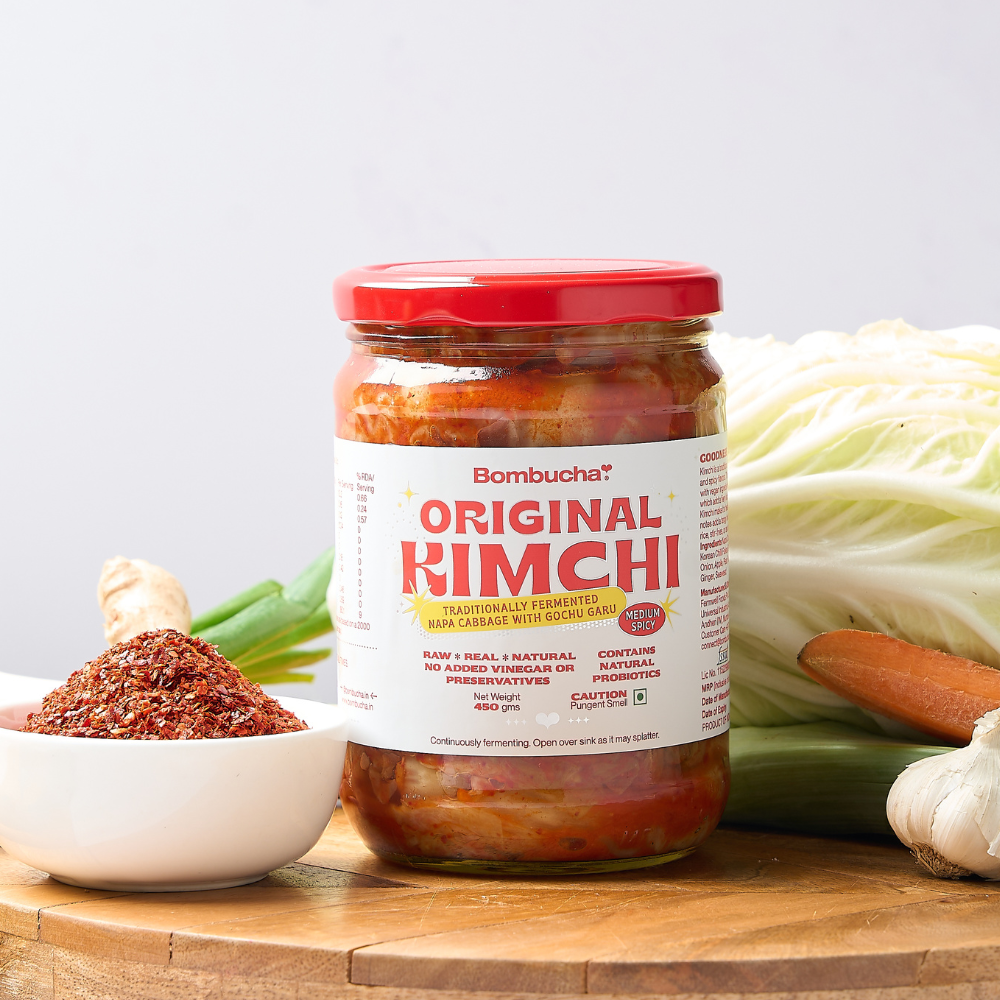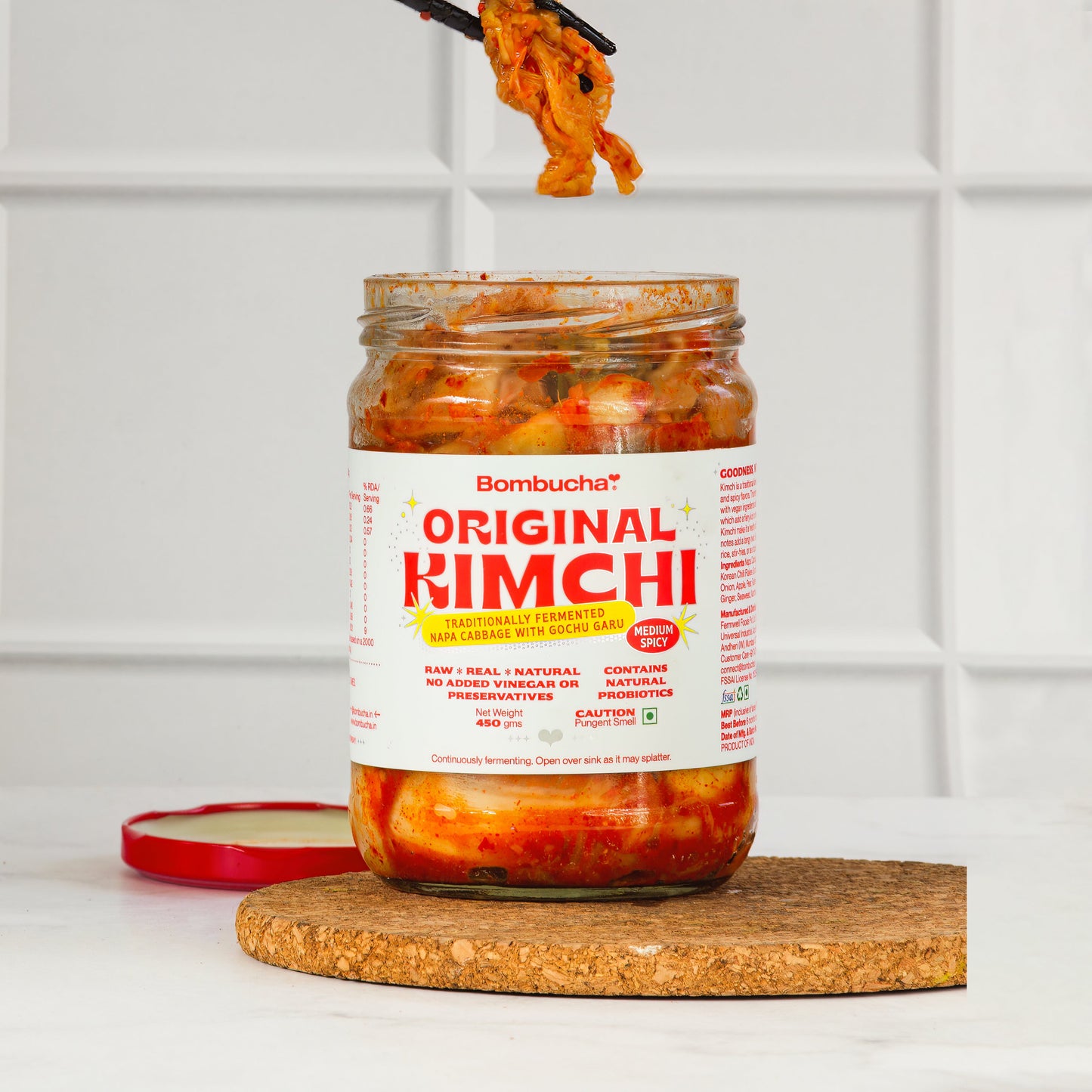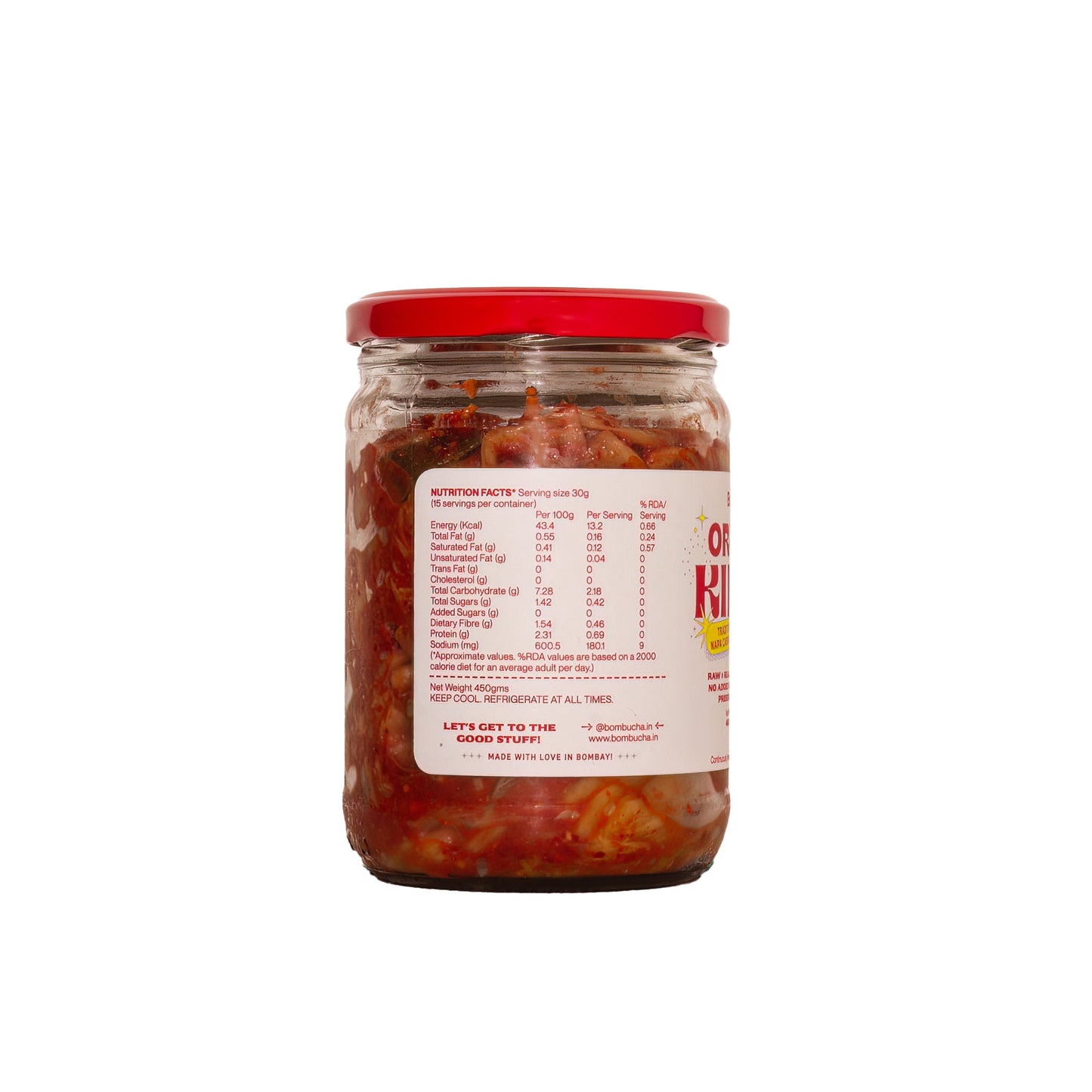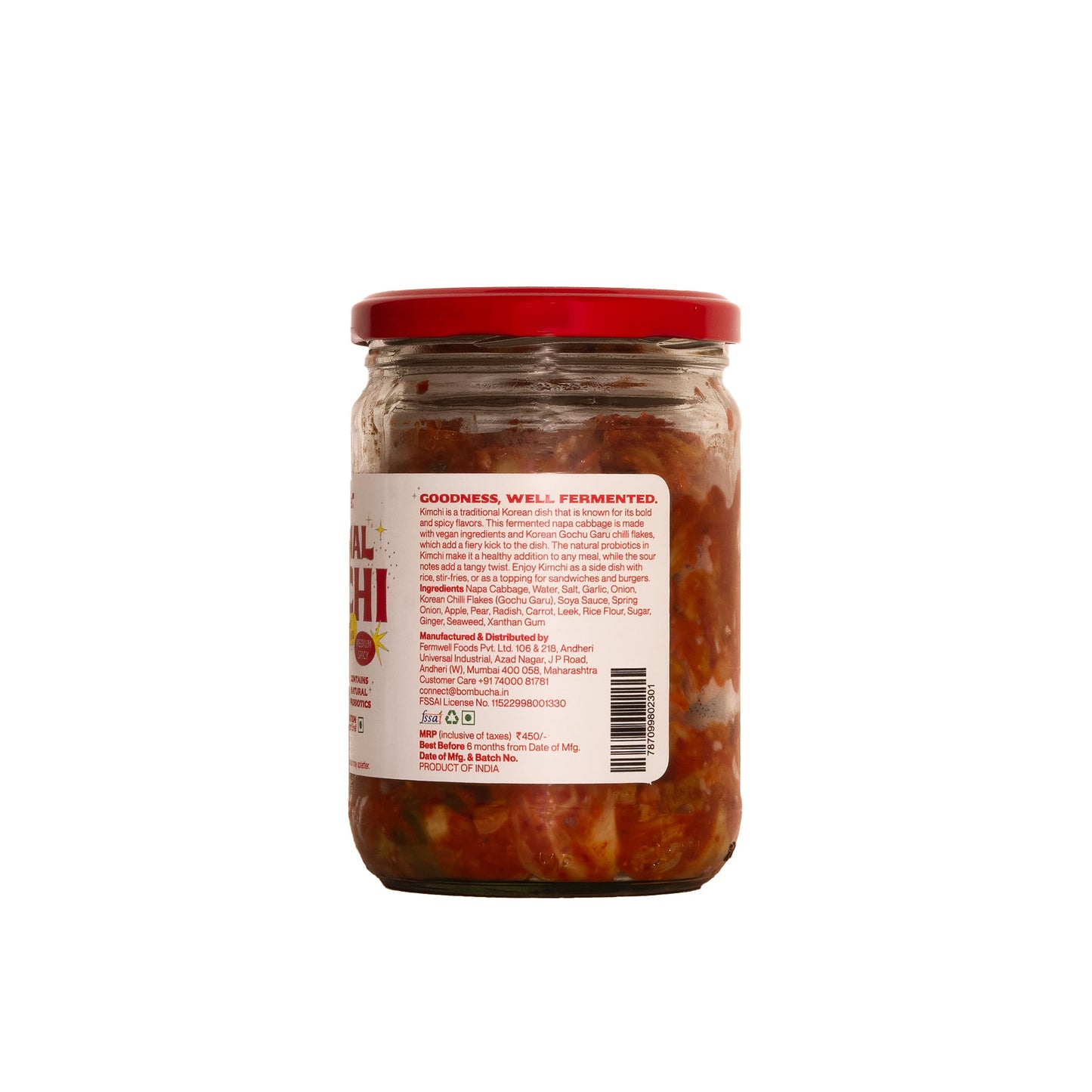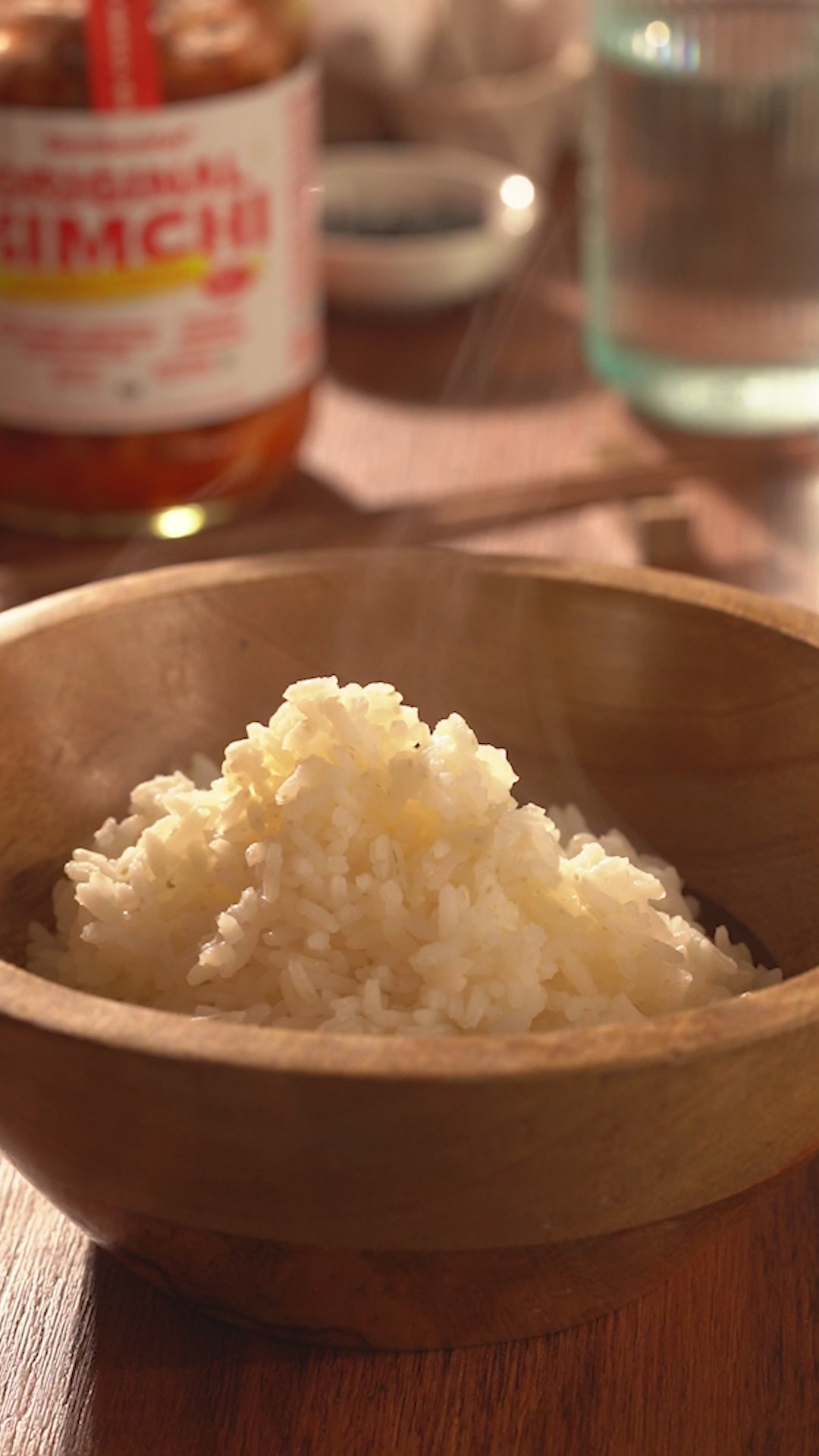BOMBUCHA-ZFW
Kimchi - Original 450gm (HYD)
Kimchi - Original 450gm (HYD)
Couldn't load pickup availability
ORIGINAL KIMCHI
For Superfast Delivery
This scrumptious Korean dish is made by fermenting napa cabbage and a wide selection of flavourful seasonings. It is packed with antioxidants and vitamins. The unique Lacto fermentation process enhances the flavours and makes it abundant in probiotics. Our Kimchi is traditionally fermented and has a spicy and sour taste profile. It is the ultimate condiment and spruces up your meal with a spicy and tangy twist.
Share
Flavour Profile
Flavour Profile
Taste: Kimchi's key flavors are tangy, spicy, and savory (umami). As it ferments, its standout taste is usually tanginess, thanks to lactic acid from the fermentation process, giving it that zesty and bold kick.
Texture and mouthfeel: Traditional kimchi made with Chinese cabbage tastes equally soft and crunchy. Kimchi becomes more compact and softer as fermentation progresses.
Smell: Kimchi's aroma matches its intense taste with a peculiar, pungent smell. As the vegetables ferment, they create a distinct fragrance that is both sharp and robust. The pungency is unmistakable, a testament to the intricate fermentation process that imparts a rich, savory character to this Korean delicacy.
Ingredients
Ingredients
Napa Cabbage, Water, Salt, Garlic, Onion, Korean Chilli Flakes (Gochu Garu), Soya Sauce, Spring Onion, Apple, Pear, Radish, Carrot, Leek, Rice Flour, Sugar, Ginger, Seaweed
Nutrition Facts (Per 100g)
Nutrition Facts (Per 100g)
Energy 43.4 Kcal
Total Fat 0.55 g
Saturated Fat 0.41 g
Unsaturated Fat 0.14 g
Trans Fat 0 g
Cholesterol 0 g
Total Carbohydrate 7.28 g
Total Sugars 1.42 g
Added Sugars 0 g
Dietary Fibre 1.54 g
Protein 2.31 g
Sodium 600.5 mg
Storage & Usage
Storage & Usage
Store under refrigeration at or below 8°C.
Kimchi can be enjoyed as it is, straight out of the jar, or can be eaten with rice, ramen, and bread. It goes well with fried rice, stew, sandwiches and can be made into fritters or pancakes. The leftover brine tastes outstanding when mixed with mayo to make a fun dip or can be drizzled over salads.
Benefits
Benefits
1. Improves Digestion: Like any other probiotic, kimchi keeps your digestive tract healthy by filling your body with good bacteria which takes care of your gut
2. Strengthens immune system: A healthy digestive tract stops unwanted toxins from entering your body thus boosting your immune system.
3. Helps to lose weight: Kimchi is low in calories and high in fibre. Fibre rich diets keep you fuller for longer and stop you from munching on unhealthy snacks.
4. Reduces stress and improves brain health: A healthy gut ensures the absorption of mood regulating minerals in your diet which reduces stress and keeps your brain healthy
5. Improves heart health: Kimchi contains bioactive compounds. These compounds block cholesterol from being absorbed in the bloodstream. The bacteria produced during the fermentation process also help in lowering cholesterol.
FAQs
FAQs
1. Why does kimchi overflow when opened?
It is absolutely natural for some kimchi jars to bubble or pop on opening. The natural fermentation process produces gases which creates pressure on the jar resulting in the overflow. It is highly advisable to always open all fermented products over the sink.
2. How much kimchi should be consumed?
You can start off with small amounts, about a forkful everyday and then gradually increase your intake.
3. How do you eat kimchi?
Kimchi is the ultimate condiment for any meal and works well with rice, ramen or consumed as it is. Its spicy and tangy flavor makes it an excellent complement to savory foods.
4. Is kimchi good for children?
In moderation, kimchi is a great fermented food for children. As it is full of probiotics, their gut will simply love it. It will improve their digestion and strengthen their immune system.
5. What kind of chilli is used in kimchi?
The distinctive flavour of kimchi comes from “Gochugaru”- Korean chilli pepper. Gochugaru has a vibrant red color and is a bit spicy, sweet, and slightly smoky.
6. Why is sugar added to kimchi?
Sugar is added as fuel for the yeast to start fermenting the cabbage. All this sugar is eaten up by the yeast so at the end of fermentation the sugar reduces to undetectable levels making your kimchi sugar-free.
7. Why does kimchi taste vinegary even though vinegar is not added?
Kimchi is a Lacto-fermented food in which the bacterium Lactobacillus breaks down sugar to lactic acid giving kimchi its peculiar sour taste which is similar to vinegar.
8. How do you know if kimchi has gone bad?
When refrigerated kimchi will not spoil for months, but a slight change in taste and texture will be observed over time. If not stored properly, foul odor or signs of mold will tell that kimchi has gone bad.
